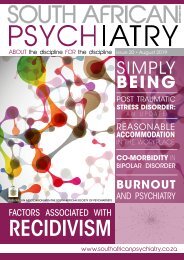South African Psychiatry - November 2018
South African Psychiatry - November 2018
South African Psychiatry - November 2018
Create successful ePaper yourself
Turn your PDF publications into a flip-book with our unique Google optimized e-Paper software.
SASOP<br />
SOUTH AFRICAN SOCIETY OF<br />
PSYCHIATRISTS<br />
• Benefits Advisory Committee<br />
Section 25(1) – To change “may” to “must”<br />
Section 25(2) – To also include:<br />
- a member seconded by the WHO Department<br />
of Mental Health and Substance Abuse<br />
- two health care providers recognised<br />
nationally for clinical expertise, one of whom has<br />
expertise in psychosocial and/or occupational<br />
intervention and rehabilitation.<br />
o The Benefits Advisory Committee is to<br />
determine the health service benefits<br />
and types of services to be reimbursed<br />
at each level of care, and to determine<br />
the detailed and cost-effective treatment<br />
guidelines, by which the services of all<br />
health care providers will be evaluated.<br />
o The scope of the health benefits and<br />
guidelines to be determined requires<br />
a perspective on health care provision,<br />
scope of practice, and service delivery<br />
which may not be in the purview of heads<br />
of medical schools and other members<br />
of the Benefits Advisory Committee<br />
• Stakeholder Advisory Committee<br />
Section 27(1) – To change “may” to “must” and<br />
to include two user-representatives of persons<br />
with disabilities.<br />
• Payment of Service Providers<br />
Section 39(2) – To include specialist level mental<br />
health services from the district setting, i.e.<br />
Community-based psychiatry.<br />
o Providing accessible, community-based<br />
psychiatric services is a necessary health<br />
system adjustment to accommodate<br />
psychosocial or intellectual disability.<br />
o Community-based psychiatry allows for<br />
accessible ambulatory assessments of new<br />
patients with severe illness, which would<br />
otherwise require expensive hospitalisation.<br />
It prevents relapse and readmission of<br />
people with chronic, severe illness by<br />
providing assertive maintenance care.<br />
o Positioning a specialist level service in the<br />
district setting provides greater opportunity<br />
for upskilling of and collaboration<br />
with PHC practitioners and other<br />
health workers, as well as inter-sectoral<br />
collaboration with local non-health and<br />
non-governmental sectors, supporting<br />
rehabilitative and palliative care within the<br />
community with a task-sharing approach.<br />
o Persisting with a solely hospicentric model of<br />
psychiatric care will not only deny accessible<br />
comprehensive health care services to the<br />
user, it will have costly negative effects on<br />
the health system and society. There is no<br />
evidence to support effective PHC care of<br />
severe mental illness without accessible<br />
specialist support and collaboration, and<br />
scant evidence for collaborative care. 3,4,5<br />
• Transitional arrangement<br />
Section 54(2)(b)(iv) – although an interim<br />
arrangement is welcome, the care of PLWMI<br />
&/or ID cannot just be an interim measure.<br />
Because most serious mental illness is chronic<br />
and relapsing, starting usually in youth and<br />
often persisting throughout life, interim measures<br />
will not clear backlogs. Proper development of<br />
mental health care services, with appropriate<br />
human resource organisation and suitable<br />
infrastructure, is needed to ensure adequate<br />
promotive, preventative, curative, rehabilitative<br />
and palliative mental health care.<br />
Section 54(4)(f) and (g) – To add a category<br />
of community-based specialist level services, at<br />
least for psychiatry if not for other specialties.<br />
This should include provision for multidisciplinary<br />
team assessment, care, treatment and<br />
rehabilitation of index presentations and of<br />
maintenance care of PLWMI &/or ID from the<br />
community platform. A flexible approach to<br />
the human resources should be incorporated<br />
so that task-sharing within the specialist level<br />
service, with PHC practitioners, and with relevant<br />
members of the community is enabled.<br />
o The implications of the current arrangement<br />
3<br />
Reilly, S. 2013 Collaborative care approaches for people with severe mental illness. Cochrane Library<br />
4<br />
Hviding, K. et al. 2007. Collaborative Care Initiatives for Patients with Serious Mental Disorders Treated in Primary<br />
Care Setting. Oslo, Norway.<br />
5<br />
Hanlon, C. et al. 2014. Challenges and opportunities for implementing integrated mental health care: a district<br />
level situation analysis from five low- and middle-income countries. PLoS One, 9, e88437.<br />
76 * SOUTH AFRICAN PSYCHIATRY ISSUE 17 <strong>2018</strong>

















